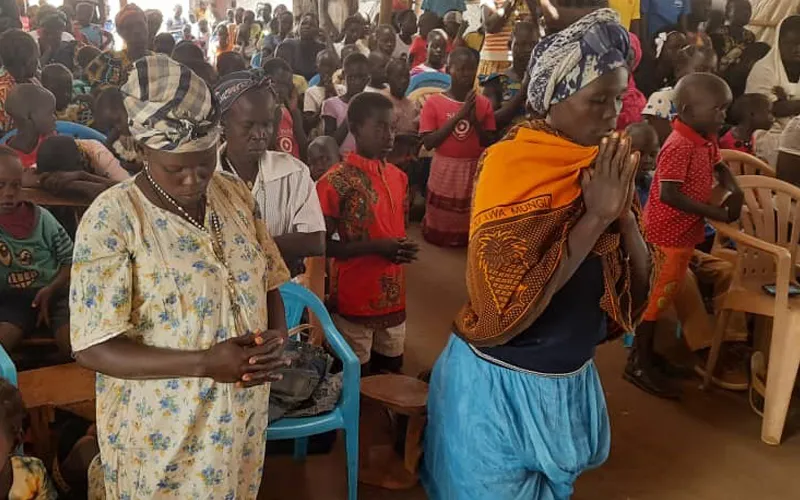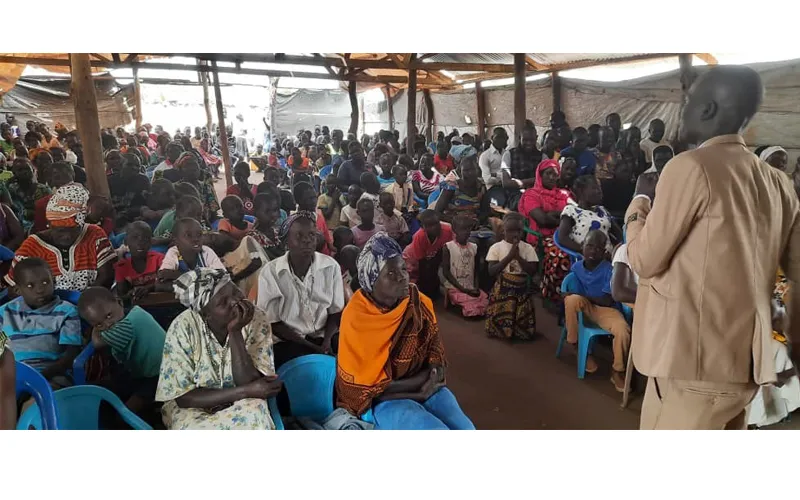To encourage more enrolment in the schools and to make the children comfortable, learning was enhanced with porridge in the morning and lunch at noon.
“With the dedicated teachers and the use of all didactic materials, our schools were the best run schools in the settlement,” Fr. Arasu says in his report shared with ACI Africa May 14, and adds, “We believe that in the refugee context rebuilding lives begins from infancy.”
As for the youth center, the SDB Priest explains, “Redundancy is the worst moment for any refugee. Unemployment and idleness can cause very many problems among the young.”
He says that the Salesians have play facilities in several places within the settlement offering games, sports and occasionally other cultural programs, especially the much-needed behavior change programs.
“This also serves as a big psychosocial support for the youth. Informally we serve several thousands of young people in Palabek,” the Priest says.
(Story continues below)
The Salesians in Gulu Archdiocese also run a feeding program in the camp, realizing that the lack of food and nutrition is a big challenge.
The refugees, he says, survive on meagre portions of food that they get through relief services.

“Children come to school on an empty stomach and they stay in school for many hours. Besides many health issues that come with lack of food, students do not have energy to concentrate in their studies,” Fr. Arasu says, adding that through donations from well-wishers, the Salesians distribute food to 11 schools within the settlement.
The agricultural project is aimed at supplementing food donated by the World Food Program, which he says plunged by 40 percent during the COVID-19 lockdown.
The reduction of food rations has in turn resulted in a myriad of challenges, including domestic violence, malnutrition, diseases such as ulcers, frustration, among others.
Agriculture Project for food production is aimed at alleviating these challenges, Fr. Arasu says, and explains, “We are working with about 2,800 persons in opening gardens, cultivating and involving in agro-business, as well as learning better skills in agriculture.”
A faith-based organization, Don Bosco Palabek Refugee Services conducts home-visits, individual counseling, leadership training among other activities to boost the spiritual growth of refugees.
Other activities at the camp include support in difficult moments such as sickness and death, group therapy, and various social celebrations in groups.
“We meet people for prayer and we offer sacramental care to several thousands of people in our 16 chapels spread across the settlement and the local area,” Fr. Arasu says, and adds, “Currently, we have built four permanent chapels, two semi-permanent chapels and several other grass chapels.”
As for community service, the Priest says, “Whenever there is a spark of violence and conflict in the settlement, Don Bosco is the first organization to reach out to the affected parties. Often we get involved in peace negotiations and facilitate reconciliation and settlement of affected parties.”
Domestic violence and other Gender Based Violence (GBV) issues are handled in confidentiality by SDB members, Fr. Arasu says, adding that many people especially women have benefited from the Clerics’ intervention.
The most thriving project at the settlement, however, is the Don Bosco Vocational Training Center (VTC) that is turning around the lives of young people in the camp.
Fr. Arasu details that when the Salesians arrived in Palabek, they found that within the radius of at least 40 kilometers, there was no post-primary institution where the teenagers and the youth could go for study and training.
“The nearest high school was in Palabek-Gem, which is about 40 kilometers from the refugee settlement,” the Priest says, and adds, “We found that it is urgent to take the youth to school and prepare them for employment with employable life-skills.”
The Salesians embarked on the construction of the Don Bosco Technical Vocational Educational Training (TVET) in 2018 and began the training in 2019.
The SDB TVET institution started by offering six-month courses in the first two years and later introduced one-year courses in Tailoring, Building, Hair-dressing, Motor Vehicle Mechanic, Solar Installation and Agriculture.
“We are happy to see many of our former students are already working and earning their living. As we keep improving the school, we are preparing our students to sit for nationally recognized examinations,” Fr. Arasu tells ACI Africa, adding that to date, the institution has trained at least 650 young men and women who already graduated and that a majority are now employed.
In his review of the activities of the Salesians in Palabek during their four years of missionary work in the East African country, Fr. Arasu says that the aim of the missionary congregation in Palabek is to improve service delivery to the youth, especially the teenage girls and young adult-women.
The group includes single mothers, unaccompanied women, head of families and other vulnerable women in need of special attention.
“In all that we do, our focus is on charity. We do not charge anyone for our services,” Fr. Arasu says, and adds, “We are a faith-based organization meaning that we serve with the eye of the Catholic Church that encourages us, finds resources for us and recognizes our ministry.”
Agnes Aineah is a Kenyan journalist with a background in digital and newspaper reporting. She holds a Master of Arts in Digital Journalism from the Aga Khan University, Graduate School of Media and Communications and a Bachelor's Degree in Linguistics, Media and Communications from Kenya's Moi University. Agnes currently serves as a journalist for ACI Africa.










